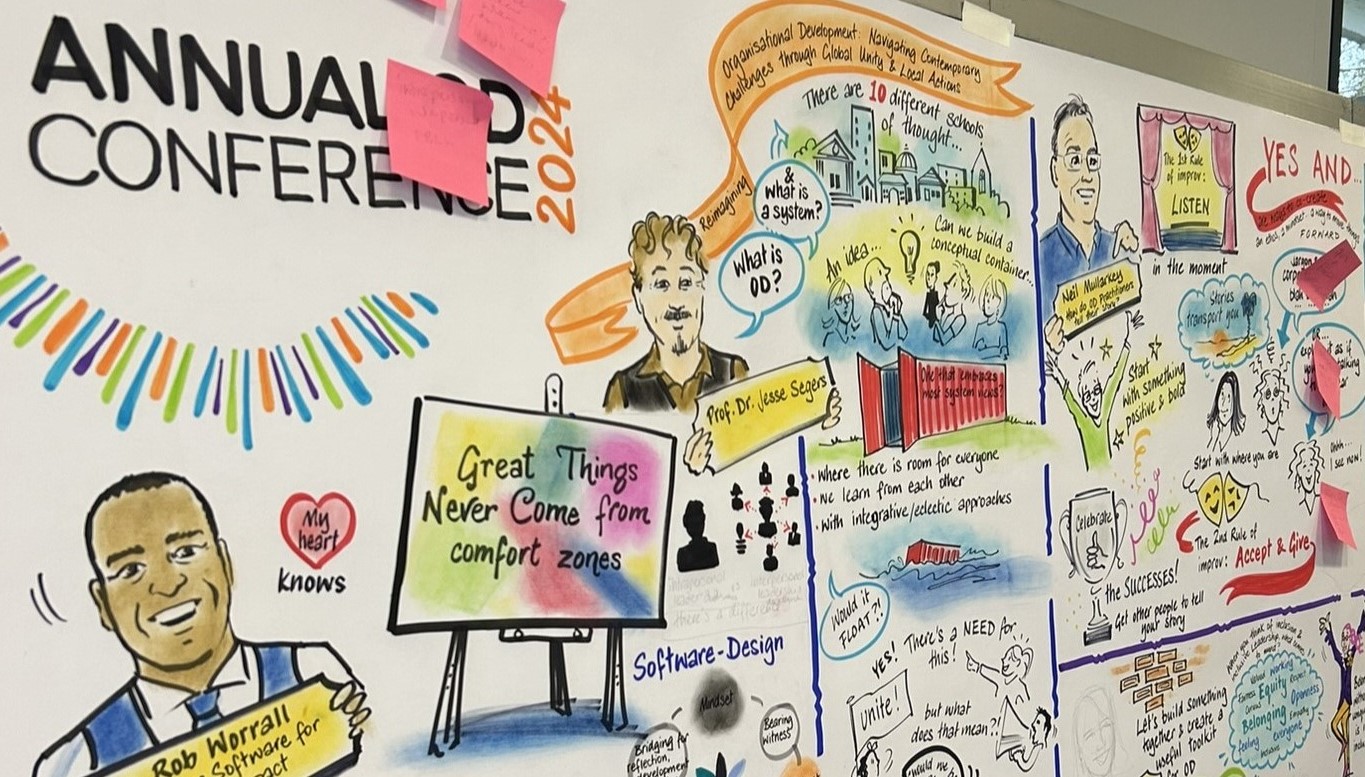If we understand organisations as patterns of interactions, then interactions within groups and the whole organisation is at the heart of OD.
For the OD practitioner’s group work, ‘awareness’ and ‘intention’ are the ‘air we breathe’ whether working with large or small groups , and whatever the purpose. ‘Awareness’ of what’s happening for you, the intrapersonal; awareness of what’s happening between individuals, the interpersonal; and what’s happening at the group level.
And by ‘intention’, we mean just that; what’s the purpose of this group? What’s the intention of my intervention? Any intervention, from silence to a direct challenge.
Group work for real

Whenever I think of working with groups I remember once working with a social welfare organisation which had a long and influential history. Along the way, the organisation had become burdened by the demands of maintaining its buildings around which the work centred, demanding ever greater investments of time and money. People were frustrated that precious time was being consumed with non-service related demands, and it was clear that the haemorrhage of money had to be stemmed, and quickly. This had brought them to the conclusion that one or more of their buildings needed to be sold; but each building had a rich heritage and no-team wanted their building to be sacrificed. So they felt stuck.
But by the end of a process spanning a several months, and countless hours in groups, this had been reversed; groups were almost falling over each other volunteering their building to be the one sold, and with a rekindled passion for what they were doing and why they were doing it. But it was a journey with many bumps along the way. So, what helped?
What helps?
As you’d expect, within the groups were different needs, wants and goals; there were power dynamics at play, and, as always, the OD practitioner’s job combine’s ‘taking things in’, ‘making sense’, and ‘intervening’.
So keeping a clear eye on the Content, Procedure, Process ‘iceberg’ helps, keeping particularly about what’s happening at the process level.
At the ‘Procedure ‘level, ‘Enquiry’ was at the heart; asking the kind of questions that drew out people’s opinions and perspectives. Asking questions that enabled people to tell their stories, and over time to shift what was going on in the group.
For example, an organisation-wide Appreciative Inquiry became known as ‘Golden Moments’ – stories people shared with each other of when the organisation had been at its best, stories of the people being served, and everything that made that possible, leading to decisions about what it would take to regain that.
Group Process
And at the Process level, what else helped? Leaving aside models of group dynamics, my personal ‘go to’ framework in these situations comes from John Herron[1], helping stay focussed on which of the six ‘dimensions’ we’re engaged in – Planning, Meaning making / Understanding, Confronting, Feeling, Structuring and Valuing. But particularly important for me is an awareness of which of the three modes I’m choosing to adopt – Hierarchical, Cooperative or Autonomous.
- The hierarchical mode
– directing the process, exercising power, doing things for the group: leading from the front, thinking and acting on behalf of the group or meeting. - The co-operative mode
– sharing power over the process: enabling and guiding the group to become more self-directing. - The autonomous mode
– respecting the total autonomy of the group: not doing things for them, or with them, but giving them freedom to find their own way, exercising their own judgement without any intervention.
We got there in the end; the groups did their own ‘heavy lifting’ and the organisational goal was achieved. And through the successes and failures along the way, there was lots of rich learning.
Top tips

Content
- Remember the ‘why’.
- What’s the purpose of this group? …for enquiry? Information sharing ? Discussion
Procedure
- Who needs to be there, and who doesn’t? Including you?
- Layout – Furniture? Tables? Sitting? Standing? Walking? Formal? Informal?
- Agenda – Or post-it notes on the walls; glass wall / white board and pens; Mindmaps
- Records – Or phone photos of flip charts / white boards, Bullets, actions, and dates
Process
- People are meaning makers – Awareness and intention
- Mindsets – Including yours! Are you there to control or enable?Tell or ask? Facilitate or direct?
- Power and influence – Groupthink, Conflict – avoid or navigate? Trust?
- Group culture – The ‘heroes’ and the ‘villains’?
- A ‘process check’ at the end – What helped us work well? How were we with each other when things got sticky? If next time was even better, what would that take?





